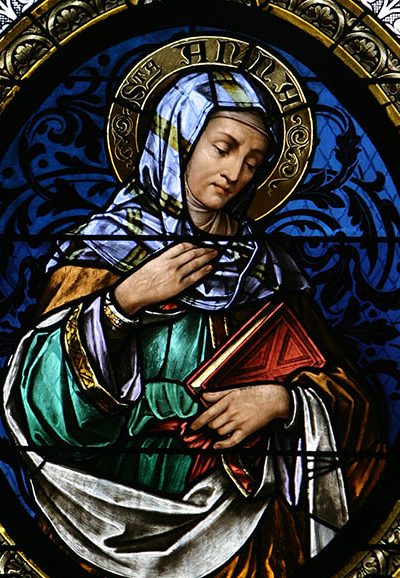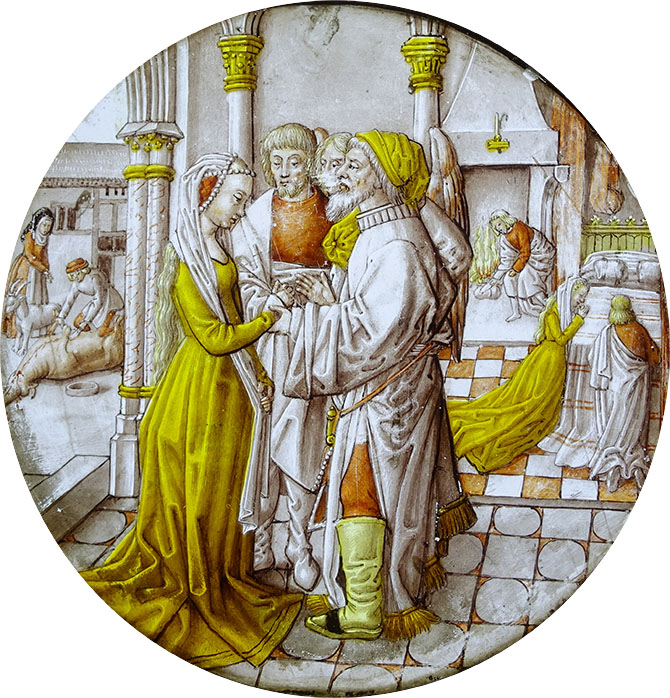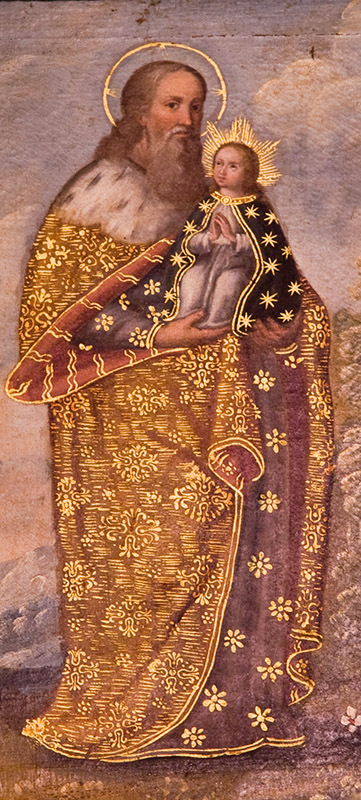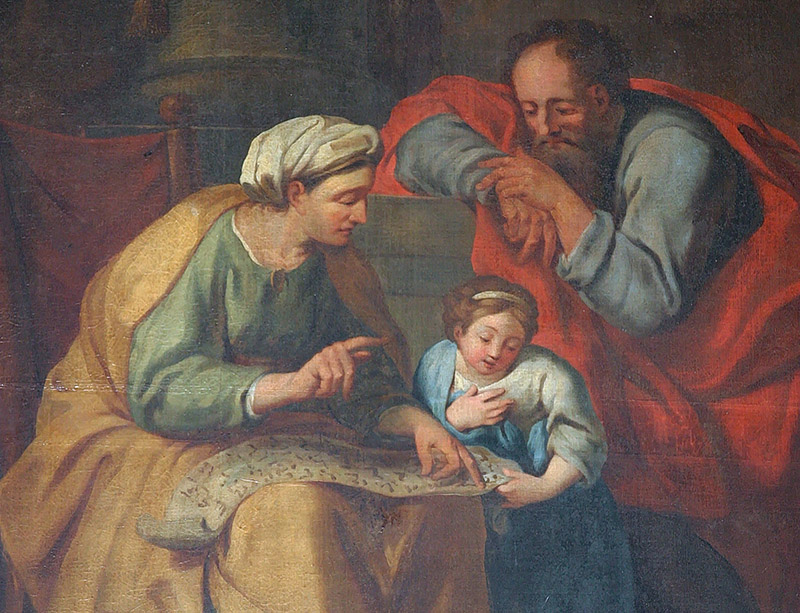From the union between St. Joachim and St. Anne would blossom the Lily of lilies, Mary Most Holy, who would give birth to the Saviour. For the optimal fulfilment of this mission, it was fitting that Providence elevate them to a previously unknown degree of sanctity.
The Eternal Word wanted to have need of a Mother in whom He would take on human nature and, summarizing the whole universe within Himself (cf. Eph 1:10), repair our first parents’ sin.
From this perspective, Our Lady’s advent not only signified an enhancement of the work of creation, but its elevation to an unimaginable plenitude. The nativity of the Queen of the Universe initiated a new regime of grace for Angels and men, allowing God to establish His Paradise1 on the physical plane. From that moment on, He could “walk” in Mary’s soul as He had prefiguratively walked in the garden of Terrestrial Paradise when He spoke with Adam “in the cool of the day” (Gn 3:8).
And for the emergence, in time, of this Paradise painstakingly prepared from all eternity, the Divine Craftsman availed himself of two chosen souls: St. Joachim and St. Anne. To understand the singular gifts Providence granted them by virtue of their extraordinary vocation, we must recall certain fundamental theological presuppositions.
Cleansed of original sin and lavished with graces

After our first parents’ fall, the Creator established a covenant with Abraham and specified rituals that would sanctify his descendants, cleansing them of the guilt of original sin and mitigating its consequences. In this way He formed a holy people for Himself, from which the Man who was the center and summit of history would be born – Jesus Christ.2 Now, in the divine mind, Our Lady was inseparably united to Him, being the masterpiece of the Most High and partner in the redemptive work of His Son.
The Father applied an altogether special care in preparing the birth of Mary and, in a certain sense, dedicated more direct and diligent attention to her entry into the world than to the birth of the Child Jesus. This was so, firstly because it was more in keeping with divine nobility to behave in this manner with a more fragile and delicate creature. And, secondly, for the simple reason that the most important and fundamental factor for the accomplishment of the Incarnation was Our Lady’s existence. With Her on the face of the earth, the Most Holy Trinity could, as it were, “rest assured” about the remaining details.
As true Israelites, Joachim and Anne had been, in due course, cleansed of original sin and lived in the state of grace. But the grandeur of the conception of the Mother of the Messiah required that they be raised to a degree of holiness and purification never before attained. Therefore, they had to be endowed with very particular gifts and virtues.
Moreover, in what concerned the Child’s constitution, it was fitting that Anne possess a holiness even greater than that of her husband, since she would become the living tabernacle of the Queen of the Universe. But God also adorned Joachim with eminent virtues, for they would be the principal inheritance he would bequeath to his Daughter. In a way, the couple’s mission surpassed that of the Angels themselves, for never did Our Lady address one of these as “mama” or “papa”…
The effects of proximity to the Mother of God and her Son
The Angelic Doctor explains that the closer one is to a cause, of whatever kind, the more one partakes in its effect.3 Applying this principle to Christ, the Font from whom all grace and truth flows (cf. Jn 1:17), those who are closest to Him benefit more from the fruits of His Incarnation, Death and Resurrection. This proximity, however, can be considered in two different aspects that are do not necessarily exclude each other: one based on blood and family ties, and the other, on complementarity of mission.
In Mary, both aspects are present in a unique way, since, by the Divine Motherhood She contributed to the formation of the most perfect Body of her Son and, as the Co-Redemptrix and universal Mediatrix of all graces, She was associated with the work of salvation He accomplished. For this reason, Our Lady was the one who most fully benefited, ante previsa merita, from the Redemption, being free of any stain of sin and full of grace from the first instant of her conception.
Something similar occurred with St. Joseph, as the Author explained in another work.4 Although the Glorious Patriarch offered no biological contribution to Jesus’ conception, his unique physical proximity, as the virginal father of the God-Man and true spouse of Mary Most Holy, likewise afforded him a sui generis participation in the effects of the Redemption.
After reviewing these fundamental principles, the question inevitably arises: what happened with the holy Anne and Joachim? The Gospels tell nothing about them, and even fail to mention their names.5 Yet, they are the parents of Our Lady and the grandparents of Jesus! … Could there exist closer and more intimate blood ties? What, then, were the effects of grace on the holy couple in view of the conception of Mary, the Immaculate? A passage from the Old Testament may help to answer these questions.
The example of Tobias and Sara
Sacred Scripture minutely narrates the marriage of Tobias to his cousin Sara, a maiden of rare beauty (cf. Tb 7-8). She was the victim of Asmodeus, the demon of impurity, who had killed her seven husbands on the first night of their marriage. They had each approached her moved by passion and, therefore, interiorly distanced from God. Deeply distressed, Sara contemplated suicide, but resisted the temptation considering the grief this would cause her good father, Raguel.

Providence, however, was preparing an admirable solution for the case. Instructed by the Archangel St. Raphael, who accompanied him in human form using the name Azarias, Tobias would overcome the concupiscence of the flesh, exorcise Asmodeus, and marry Sara with a pure heart.
With the due consent of the parents, the marriage feast was solemnly celebrated. Afterward, having just entered the nuptial chamber, Tobias addressed Sara, saying: ‘Sara, arise, and let us pray to God today, and tomorrow, and the next day: because for these three nights we are joined to God: and when the third night is over, we will be in our own wedlock. For we are the children of Saints, and we must not be joined together like heathens that know not God” (8:4-5).

When the fixed time had elapsed, observed by both in fervent prayer, Tobias prayed to God before consummating the marriage: “Lord, Thou knowest that not for fleshly lust do I take my sister to wife, but only for the love of posterity, in which Thy name may be blessed for ever and ever” (8:9).
By his purity and obedience to the Angel’s counsel, Tobias exorcised his nuptial union and enjoyed a long life in Sara’s company.
The most chaste begetting of Mary, prelude to the divine vengeance
In the light of this fact, the question arises about Sts. Joachim and Anne. Considering that the most excellent qualities of the chosen people converged in them, in what pertains to both natural and supernatural gifts, with a view to the full manifestation of these qualities in Our Lady and in the God-Man, it seems reasonable to hold that they too, in an even more perfect manner than Tobias and Sara, were purified of the concupiscence of the flesh before Mary’s conception.6
Moreover, since Our Lady is the universal Mediatrix of all graces – a mediation which, consequently, embraces the whole history of creation – would her own parents not be the first to benefit from this prerogative? This hypothesis presents itself as the most decorous and chaste mode of preparation for the dawn of Redemption, the Blessed Virgin’s conception being the break of this dawn.
the Author believes the work of Providence was completed in both of them on that occasion, so that concupiscence would in no way tarnish the couple’s spirits in the begetting of Mary.7 Thus, the most chaste conception of Our Lady would be the prelude to the vengeance upon the serpent, which God had promised in Paradise: “She shall crush thy head” (Gn 3:15). ◊
Taken, with small adaptations, from:
CLÁ DIAS, EP, João Scognamiglio.
Maria Santíssima! O Paraíso de Deus revelado aos homens.
[Mary Most Holy! God’s Paradise Revealed to Men.]
São Paulo: Arautos do Evangelho, 2020, v.II, p.57-73
1 Regarding this paradise, St. Louis-Marie Grignion de Montfort affirms: “the Blessed Virgin is the true earthly paradise of the new Adam and that the ancient paradise was only a symbol of Her. […] In this earthly paradise grows the real Tree of Life which bore Our Lord, the fruit of Life, the tree of knowledge of good and evil, which bore the Light of the world. In this divine place there are trees planted by the hand of God and watered by His divine unction which have borne and continue to bear fruit that is pleasing to Him. There are flower-beds studded with a variety of beautiful flowers of virtue, diffusing a fragrance which delights even the Angels” (ST. LOUIS-MARIE GRIGNION DE MONTFORT. Traité de la vraie dévotion à la Sainte Vierge, n.261)
2 In His infinite goodness, the Father never abandoned man after Adam’s fault. On the contrary, at every moment and in every circumstance, He always offers humanity a salvific remedy, as St. Augustine (cf. Epistola CII. Ad Deogratias, n.12), St. Leo the Great (cf. In nativitate Domini. Sermo IV, n.1: SC 22 bis, 106?110) and St. Thomas Aquinas (cf. Scriptum super Sententiis. L.IV, d.1, q.2, a.4, qc.2) teach. Thus, among the ordinary means for the remission of original guilt, God established circumcision in the Old Testament and the Sacrament of Baptism in the New Testament. The Angelic Doctor affirms that circumcision pardoned original sin and conferred sanctifying grace with all its effects, although the impediment to entering the Kingdom of Heaven remained, which would only be removed with the Passion of Christ; Baptism, in turn, grants not only the pardon of original sin and all actual guilt, but also the satisfaction of the penalty due to them, conferring graces incomparably more abundant than circumcision (cf. ST. THOMAS AQUINAS. Summa Theologiæ. III, q.70, a.4). However, God’s power is not limited to circumcision or the Sacrament of Baptism, but transcends them and can even confer its effects without performing these rites (cf. Idem, q.64, a.3; a.7; q.66, a.6; q.68, a.2).
3 Cf. ST. THOMAS AQUINAS. Summa Theologiæ. III, q.27, a.5.
4 Cf. CLÁ DIAS, EP, João Scognamiglio. São José: quem o conhece? [St. Joseph: Who Knows Him?]… São Paulo: Lumen Sapientiæ, 2017, p.29-47.
5 The names of St. Joachim and St. Anne appear for the first time in the Protoevangelium of St. James, an apocryphal writing from the second century. However, their assimilation by the Fathers and ecclesiastical writers, as well as their insertion in the liturgical cult, from the 6th century in the East and the 8th century in the West, weigh decisively in favour of this being an authentic fact of Tradition. Benedict XIV concludes: “Since the general opinion in both the Eastern and Western Churches has been that the parents of the Blessed Virgin were called Joachim and Anne for many centuries, there is no reason to oppose this conviction, especially since there is nothing to the contrary that we have not refuted with solid reasons” (BENEDICT XIV. De festis Beatæ Mariæ Virginis, c.IX, n.19).
6 Adam’s sin deprived the whole human race of its original sanctity and justice, harming it in its own natural strength, subjecting it to ignorance, death and suffering and inclining it to evil (cf. CCC 405). This inclination to sin, called fomes peccati – literally, the kindling for sin – or concupiscence, leads the sensitive appetite, in which passions reside, to not submit to reason and the empire of the will. As St. Thomas states “in the state of innocence the inferior appetite was wholly subject to reason: so that in that state the passions of the soul existed only as consequent upon the judgment of reason” (ST. THOMAS AQUINAS. Summa Theologiæ. I, q.95, a.2). Even after Baptism, man must constantly fight this evil inclination, whose impetus will diminish as he progresses in grace and the practice of virtue.
7 Cf. ALASTRUEY, Gregorio. Tratado de la Virgen Santísima. 4.ed. Madrid: BAC, 1956, p.25.

